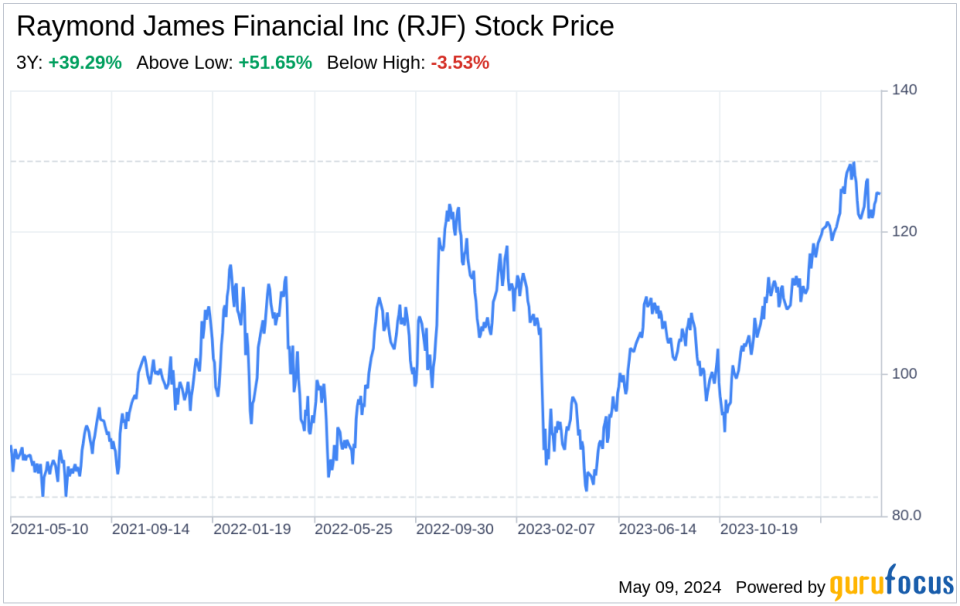Decoding Raymond James Financial Inc (RJF): A Strategic SWOT Insight
Robust financial performance with significant year-over-year growth in net revenues and net income.
Strong market position in wealth management with over $1.2 trillion assets under administration.
Strategic initiatives to enhance liquidity and capital resources, ensuring long-term sustainability.
Regulatory changes and market volatility present ongoing challenges and threats to performance.
On May 7, 2024, Raymond James Financial Inc (NYSE:RJF) filed its latest 10-Q report, revealing a comprehensive overview of its financial health and operational strategies. As a financial holding company with a diverse portfolio of services, including wealth management, investment banking, asset management, and commercial banking, RJF continues to support a vast network of financial advisors while managing over $1.2 trillion in assets. The recent filing indicates a solid financial performance, with net revenues increasing from $2.873 billion in the first half of 2023 to $3.118 billion in the same period of 2024. Net income also saw a rise from $427 million to $476 million year-over-year. These figures underscore RJF's financial resilience and its ability to generate shareholder value amidst dynamic market conditions.

Strengths
Financial Performance and Market Position: RJF's financial results from the latest SEC filing highlight its robust performance and strong market position. The company's net revenues increased by 8.5% year-over-year, with net income also showing a healthy rise. This financial stability is underpinned by a significant presence in the wealth management sector, where RJF administers over $1.2 trillion in assets. The company's revenue streams are diversified, with a substantial portion coming from asset management and related administrative fees, which saw an increase from $1.302 billion to $1.516 billion over six months. This financial strength provides RJF with the capital to invest in technology, attract top talent, and pursue strategic acquisitions, further solidifying its market position.
Capital and Liquidity Management: RJF has demonstrated prudent capital and liquidity management, as evidenced by its regulatory capital ratios and liquidity reserves. The company's Tier 1 capital and Total capital ratios have improved, reflecting an increase in regulatory capital and a well-managed increase in risk-weighted assets. RJF's liquidity management framework ensures sufficient funding even in stressed market conditions, with cash and cash equivalents (excluding amounts segregated for regulatory purposes and restricted cash) increasing by $688 million to $10.00 billion. This financial prudence positions RJF to navigate market volatility and invest in growth opportunities.
Weaknesses
Operational Costs: Despite strong revenue growth, RJF's operational costs have also increased, with total non-interest expenses rising from $2.316 billion to $2.509 billion year-over-year. This increase is primarily driven by compensation, commissions, and benefits, which constitute the largest expense category. As RJF continues to grow, managing these costs will be crucial to maintaining profitability and competitive pricing for its services. The company must continue to seek efficiencies and control expenses to sustain its financial performance.
Dependence on U.S. Markets: RJF's revenues are heavily reliant on the U.S. market, with approximately 90% of its revenue generated domestically. This concentration exposes the company to regional economic fluctuations and could limit growth potential. Diversifying revenue streams geographically could mitigate this risk and provide more stable income sources, especially in the face of potential economic downturns in the U.S.
Opportunities
Technological Advancements: RJF has the opportunity to leverage technology to enhance its service offerings, improve operational efficiency, and attract a broader client base. Investing in digital platforms and advanced analytics can enable RJF to provide more personalized and efficient services, which is critical in the competitive wealth management and financial services industry. Technological innovation can also lead to new revenue streams and business models, such as robo-advisory services and blockchain applications.
Strategic Acquisitions: RJF's strong financial position enables it to pursue strategic acquisitions that can expand its market reach, diversify its services, and enhance its competitive edge. Acquiring firms with complementary capabilities or innovative technologies can accelerate RJF's growth and allow it to tap into new customer segments and markets.
Threats
Regulatory Changes: The financial industry is highly regulated, and changes in regulations can significantly impact RJF's operations and profitability. For instance, the proposed rules by U.S. banking regulators could result in higher capital requirements and the elimination of the AOCI opt-out election, potentially reducing RJF's regulatory capital ratios. RJF must stay vigilant and adapt to regulatory changes to mitigate their impact on its business model and financial standing.
Market Volatility: RJF's performance is subject to market risks, including equity price risk and foreign exchange risk. Market volatility can affect the value of RJF's trading inventory and investment portfolio, leading to potential losses. Additionally, RJF's international operations expose it to currency fluctuations, which can impact its financial results. Effective risk management strategies are essential to minimize the adverse effects of market volatility on RJF's earnings and capital position.
In conclusion, Raymond James Financial Inc (NYSE:RJF) exhibits a strong financial foundation and a commanding presence in the wealth management sector. The company's strategic management of capital and liquidity resources positions it well for sustainable growth. However, challenges such as increasing operational costs and dependence on the U.S. market must be addressed. Opportunities in technological innovation and strategic acquisitions present avenues for expansion, while regulatory changes and market volatility remain significant threats. RJF's ability to leverage its strengths, address its weaknesses, capitalize on opportunities, and mitigate threats will be critical
This article, generated by GuruFocus, is designed to provide general insights and is not tailored financial advice. Our commentary is rooted in historical data and analyst projections, utilizing an impartial methodology, and is not intended to serve as specific investment guidance. It does not formulate a recommendation to purchase or divest any stock and does not consider individual investment objectives or financial circumstances. Our objective is to deliver long-term, fundamental data-driven analysis. Be aware that our analysis might not incorporate the most recent, price-sensitive company announcements or qualitative information. GuruFocus holds no position in the stocks mentioned herein.
This article first appeared on GuruFocus.

 Yahoo Finance
Yahoo Finance 